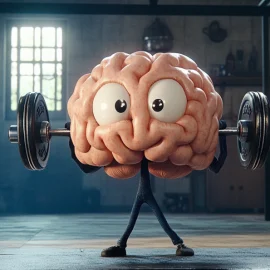

This article is an excerpt from the Shortform book guide to "The Willpower Instinct" by Kelly McGonigal. Shortform has the world's best summaries and analyses of books you should be reading.
Like this article? Sign up for a free trial here .
In what ways is using willpower like working out at the gym? Why is self-control highest in the morning? Can you increase your willpower stamina?
The more you use your willpower, the more it becomes depleted, just like your energy when you work out at the gym. Willpower depletion can lead to negative side-effects such as binge eating or spending money. Luckily, there are ways to counter willpower depletion and ways to increase your willpower stamina.
Continue below for research and tips on willpower depletion.
How Willpower Gets Depleted
What is willpower depletion? Every time you use your willpower, it’s a lot like doing a bicep curl with a heavy dumbbell. You can only do so many reps before your arm muscles fatigue completely and you can’t lift the weight one more time. Your willpower reserve is just like that. The willpower “muscle” has limited strength, and once that’s depleted, your best intentions can backslide.
The research: Studies have shown that if a smoker gives up cigarettes for 24 hours, he or she is more likely to binge on candy. People who are on a restrictive diet are more likely to cheat on their spouses. And people who try to engage in too many self-improvement projects at once—say, giving up sugar and sticking to a budget at the same time—are less successful than those who choose just one project.
Any time you have to make yourself do something difficult—whether it’s making a presentation at work or choosing between 50 brands of laundry detergent at the grocery store, you’re using up willpower. If your brain is utilizing the pause-and-plan response, it’s going to get weary.
It’s not surprising that for most people, self-control is highest in the morning and diminishes as the day progresses. Our daily mental challenges use up that precious resource.
But that doesn’t mean we’re doomed to fail at exercising willpower. It’s possible to find ways to overcome willpower exhaustion. Just like we train the muscles in our body, we can train our “willpower muscle” to become stronger so our stamina lasts longer.
Willpower Depletes Your Brain’s Energy Budget
Part of the reason our self-control system tires out easily is that the brain likes to hoard its energy. The brain is dependent on a steady stream of glucose to function, and it’s constantly checking the bloodstream to make sure there’s enough glucose floating around. If it detects a slight shortage, it may decide to stop spending energy and start hoarding it. It cuts out any activities that are energy-expensive, and one of the first to go is self-control. Suddenly you feel like you can’t focus your attention, can’t modulate your emotions, and can’t resist temptation. You’re a victim of the “energy budget” model of how willpower works.
When your glucose level drops, your brain does the easiest thing: It chooses short-term thinking and impulsive acts. And while it’s true that a shot of candy or a sweet drink can give you a brief willpower and mood-brightening boost, it won’t last long.
The research: Tempting as it may be to keep your brain energized with a big bowl of M&Ms, studies show you’ll have more consistent energy if you fuel your body with a low-glycemic diet, which keeps your blood sugar steady over longer periods of time. Try a hard-boiled egg or a few bites of cheese instead.
Willpower Hack: Cultivate One Small Habit
If willpower depletes so easily, what can you do to restore it? Challenge your willpower muscles with a non-taxing exercise regime designed to train your brain for self-control: Start by committing to doing something every day just for the practice of building a habit. It could be as simple as walking around the block before you have coffee in the morning, or doing 10 pushups before you go to bed at night. Since it’s something you aren’t used to doing, your brain will have to make an effort to remember to do it and then carry it out. Small challenges are best because you can strengthen your willpower without exhausting it.
Devote yourself fully to any small, consistent act of willpower, and you’ll be surprised to find you have more self-control in other areas of your life. By taking on tiny, low-stakes willpower challenges, the brain gets in the habit of pausing before acting. You’re developing the habit of paying attention to your actions and choosing to do the harder thing, not the automatic thing.
Willpower Hack: Keep Detailed Records

———End of Preview———
Like what you just read? Read the rest of the world's best book summary and analysis of Kelly McGonigal's "The Willpower Instinct" at Shortform .
Here's what you'll find in our full The Willpower Instinct summary :
- That willpower isn't a character trait but rather an innate instinct that's wired into our brains
- How marketers can use "neuromarketing" to influence you to purchase more
- How you can harness your innate willpower to achieve your goals






